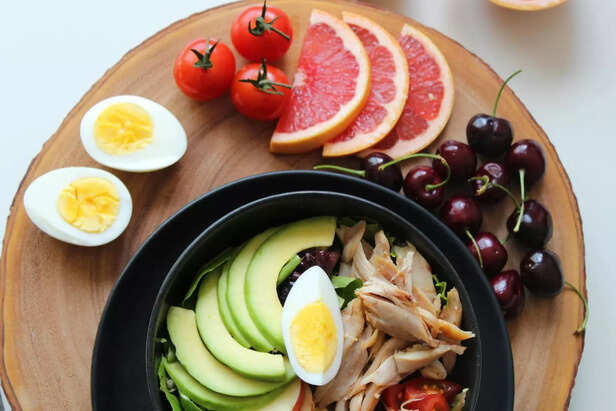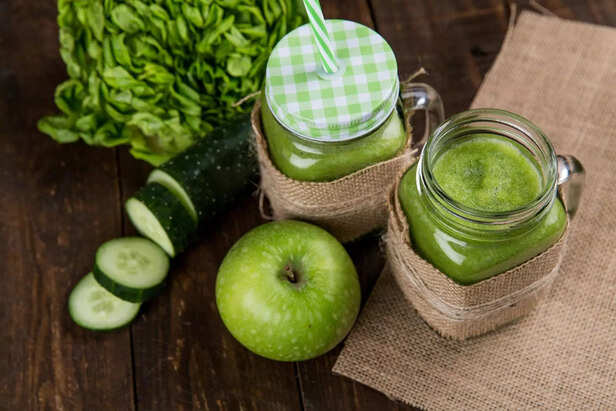Healthy Eating on a Budget: Say Goodbye to Junk Food
Riya Kumari | Feb 15, 2025, 23:59 IST
( Image credit : Pexels, Timeslife )
Let’s get one thing straight, shall we? "Healthy eating" isn't just for the wellness gurus who sip kale smoothies while chanting affirmations and hanging out in yoga studios where they probably have a waiting list for their chakras. No. Healthy eating is for YOU. Yes, you, sitting there with a half-empty bag of chips and a suspiciously large container of ice cream. But hey, we’ve all been there, haven’t we?
It’s easy to think that eating healthy is a luxury reserved for the wealthy or those with too much time on their hands. We’ve all been there—standing in the grocery aisle, staring at the prices of fresh vegetables, wondering if your paycheck can handle it. And then, there’s the allure of fast food. Cheap, convenient, and instant gratification. But let’s pause for a moment and think beyond the surface. Healthy eating isn’t just a lifestyle; it’s an investment. And you don’t need to be a millionaire to make that investment. Eating well doesn’t have to cost a fortune, and it certainly doesn’t require you to give up your beloved street food.
1. Why We Need to Rethink Junk Food

Junk food, in all its many forms, has been cleverly marketed to us. It’s tempting, it’s fast, and it’s comforting—but that comfort comes at a price. We think we’re saving time and money, but in reality, we’re depleting our health, draining our energy, and fueling the very habits that lead to chronic illnesses.
And yet, as a country, we’ve grown accustomed to it. Whether it’s the mid-afternoon samosa, the quick packet of chips during your commute, or the evening chai with biscuits, junk food has become a crutch. It’s woven into the fabric of our daily routines, often with little thought about the long-term consequences. But here’s the thing: we don’t have to choose between convenience and our well-being. We just have to be intentional.
2. The Misconception: Healthy Eating is Expensive

Here’s a truth we often miss—healthy eating doesn’t require imported avocados or quinoa from the Himalayas. It’s about understanding what’s available in your local market, what’s in season, and what’s already a part of your daily food culture. Lentils, whole grains, seasonal vegetables, and fruits—they don’t have to cost an arm and a leg. And when we think of eating healthy, we need to remember that food doesn’t need to be fancy to be nutritious.
What if we stopped believing the myth that we can only be healthy if we spend a fortune on food? What if we reconnected with our roots, embraced our local cuisine, and focused on what our ancestors knew: simplicity is often the best solution. Bajra roti, sambar, dal, and sabzi—it’s wholesome, filling, and affordable. And it’s been working for generations.
3. The Power of Small Changes

We don’t need grand gestures or massive lifestyle shifts. Start with small, deliberate choices. Choose whole foods over processed ones. Use the spices and ingredients already in your kitchen. Embrace cooking at home—it doesn’t have to be a complex affair. A simple bowl of dal and rice can nourish your body and soul in ways that no packet of chips ever will.
It’s not just about the food you eat, but the relationship you build with it. Cooking isn’t a chore, it’s an act of care. Think about it: you’re feeding yourself, your family, your community. The choices you make can shape not just your own health, but the well-being of those around you.
4. Rethinking Convenience

Yes, fast food is convenient. But there’s a deeper question we should be asking: convenient for whom? Fast food chains are built on convenience for their business model, not for your long-term health. We’ve become so accustomed to getting everything instantly, from instant noodles to instant gratification, that we’ve lost the appreciation for the time it takes to prepare a meal that truly nourishes. But cooking doesn’t have to be time-consuming. The tools you need—pressure cookers, simple stoves, and local ingredients—are all within reach.
It’s about building a new definition of convenience. Convenience isn’t about grabbing something pre-packaged. It’s about knowing that what you’re putting into your body is nourishing and sustainable. It’s about creating routines that bring you closer to your health, not further away.
Reclaiming Our Health, One Meal at a Time
This is more than a trend. It’s a revolution—one meal at a time. Healthy eating isn’t just about avoiding the unhealthy stuff; it’s about choosing what’s right for your body, your culture, and your future. It’s about being mindful of what we consume, both for our physical health and for our emotional well-being. After all, food is not just fuel. It’s a reflection of who we are, what we value, and how we choose to live.
So, let’s rethink what it means to eat well in India. We don’t need to rely on junk food or overpriced imported goods to feel satisfied. We’ve got everything we need already. All it takes is a little thought, a little intention, and a whole lot of respect for what’s been passed down to us. Because in the end, eating healthy isn’t a luxury—it’s a privilege. And it's one we should reclaim.
1. Why We Need to Rethink Junk Food

Junk food
( Image credit : Pexels )
Junk food, in all its many forms, has been cleverly marketed to us. It’s tempting, it’s fast, and it’s comforting—but that comfort comes at a price. We think we’re saving time and money, but in reality, we’re depleting our health, draining our energy, and fueling the very habits that lead to chronic illnesses.
And yet, as a country, we’ve grown accustomed to it. Whether it’s the mid-afternoon samosa, the quick packet of chips during your commute, or the evening chai with biscuits, junk food has become a crutch. It’s woven into the fabric of our daily routines, often with little thought about the long-term consequences. But here’s the thing: we don’t have to choose between convenience and our well-being. We just have to be intentional.
2. The Misconception: Healthy Eating is Expensive

Healthy food
( Image credit : Pexels )
Here’s a truth we often miss—healthy eating doesn’t require imported avocados or quinoa from the Himalayas. It’s about understanding what’s available in your local market, what’s in season, and what’s already a part of your daily food culture. Lentils, whole grains, seasonal vegetables, and fruits—they don’t have to cost an arm and a leg. And when we think of eating healthy, we need to remember that food doesn’t need to be fancy to be nutritious.
What if we stopped believing the myth that we can only be healthy if we spend a fortune on food? What if we reconnected with our roots, embraced our local cuisine, and focused on what our ancestors knew: simplicity is often the best solution. Bajra roti, sambar, dal, and sabzi—it’s wholesome, filling, and affordable. And it’s been working for generations.
3. The Power of Small Changes

Cucumber
( Image credit : Pexels )
We don’t need grand gestures or massive lifestyle shifts. Start with small, deliberate choices. Choose whole foods over processed ones. Use the spices and ingredients already in your kitchen. Embrace cooking at home—it doesn’t have to be a complex affair. A simple bowl of dal and rice can nourish your body and soul in ways that no packet of chips ever will.
It’s not just about the food you eat, but the relationship you build with it. Cooking isn’t a chore, it’s an act of care. Think about it: you’re feeding yourself, your family, your community. The choices you make can shape not just your own health, but the well-being of those around you.
4. Rethinking Convenience

Salad
( Image credit : Pexels )
Yes, fast food is convenient. But there’s a deeper question we should be asking: convenient for whom? Fast food chains are built on convenience for their business model, not for your long-term health. We’ve become so accustomed to getting everything instantly, from instant noodles to instant gratification, that we’ve lost the appreciation for the time it takes to prepare a meal that truly nourishes. But cooking doesn’t have to be time-consuming. The tools you need—pressure cookers, simple stoves, and local ingredients—are all within reach.
It’s about building a new definition of convenience. Convenience isn’t about grabbing something pre-packaged. It’s about knowing that what you’re putting into your body is nourishing and sustainable. It’s about creating routines that bring you closer to your health, not further away.
Reclaiming Our Health, One Meal at a Time
So, let’s rethink what it means to eat well in India. We don’t need to rely on junk food or overpriced imported goods to feel satisfied. We’ve got everything we need already. All it takes is a little thought, a little intention, and a whole lot of respect for what’s been passed down to us. Because in the end, eating healthy isn’t a luxury—it’s a privilege. And it's one we should reclaim.
